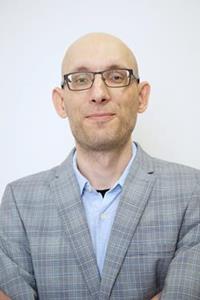Docent Karel Černý, head of the Institute for the History of Medicine and Foreign Languages
 I am from a medical family, my
father, both sisters, and brother-in-law are all doctors. But in the early
1990s, I became enchanted by philosophy and history, because it felt that these
areas respond to the new challenges of post-totalitarian society. I studied
cultural history and expected to spend the rest of my life working in some
museum or archive. By a lucky coincidence, though, I first found employment in
Prague and then was successful in competing for a position at the Institute for
the History of Medicine and Foreign Languages. As a historian, I realise daily
what a privilege it is to work at a faculty whose history reaches back to the
High Middle Ages: in the vault of our institute is the oldest of the faculty’s
books, a manuscript from 1474, on a shelf in the reading room stands the oldest
faculty journal (Vierteljahrschrift für die praktische Heilkunde) from
the first half of the nineteenth century, and the walls of many buildings
feature portraits of former deans, some from the eighteenth century. I have
deep respect for the work of physicians who daily save human health and often
even lives. We, historians, save only stories. So my aim is at least to try to
make sure that these stories are to the benefit of medicine, according to the
ancient motto primum nil nocere.
I am from a medical family, my
father, both sisters, and brother-in-law are all doctors. But in the early
1990s, I became enchanted by philosophy and history, because it felt that these
areas respond to the new challenges of post-totalitarian society. I studied
cultural history and expected to spend the rest of my life working in some
museum or archive. By a lucky coincidence, though, I first found employment in
Prague and then was successful in competing for a position at the Institute for
the History of Medicine and Foreign Languages. As a historian, I realise daily
what a privilege it is to work at a faculty whose history reaches back to the
High Middle Ages: in the vault of our institute is the oldest of the faculty’s
books, a manuscript from 1474, on a shelf in the reading room stands the oldest
faculty journal (Vierteljahrschrift für die praktische Heilkunde) from
the first half of the nineteenth century, and the walls of many buildings
feature portraits of former deans, some from the eighteenth century. I have
deep respect for the work of physicians who daily save human health and often
even lives. We, historians, save only stories. So my aim is at least to try to
make sure that these stories are to the benefit of medicine, according to the
ancient motto primum nil nocere.
